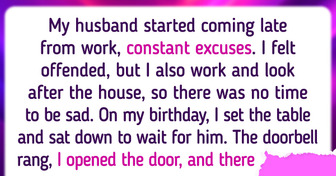soo tis is ... ok so i wud not do tat ok i am going to be good cuz i 100% do not like
geting mad and i do so have a good day
7 Effective Ways to Solve Conflicts With Your Partner
We all understand that the key to a healthy relationship is good communication. However, the solution to solving arguments without letting them escalate is all in the details. These are not always due to obvious name-calling arguments, but they can be just as destructive over a period of time. Sometimes starting the phrase with a simple “I” can change things for the better.
We at Bright Side found a few ways we can easily adapt in our relationships, helping to keep things healthy and strong.
1. Don’t repeat yourself.

Repetitive and non-meaningful words can distance your partner, and they might stop listening to you. If you’re repeating yourself, even if it’s about something you both have already discussed, your partner might get irritated by you.
Instead, even if you want to confirm a problem you have already talked about, try to avoid words and phrases, such as “like” or “you know,” and don’t let your anger dominate your tone.
2. Avoid using adjectives that sound judgemental.

It’s surprising how common, everyday expressions can make you sound judgemental, even if you didn’t want to. That’s why many arguments arise when you don’t expect them to, and they might even turn into a major conflict.
To avoid using judgemental adjectives, it’s good to use statements with opinions.
- Replace “good” or “bad” with “don’t like,” “do like,” and other similar words.
- Replace “right” or “wrong” with “disagreement” or “argument.”
- Change clauses or statements about truth. That means, don’t start a sentence with “The truth is...”
- Change statements about reality and truth and use the word, “believe.” So start by saying, “I believe...”
3. Understand your feelings first.

You might want to identify your feelings first because they can be the main reason your judgment is clouded. Because of this, you should get your feelings under control first. If you notice that your feelings can influence your decisions, find a way to release them.
- Take a walk alone or take your dog for a walk.
- Listen to calming music.
- Call a friend and vent so that you can take your mind off things.
- Practice deep breathing and use the 4-7-8 method. Inhale through your nose for 4 counts, hold it for 7 counts, then release it through your mouth for 8 counts.
4. Don’t jump to conclusions (understand your partner first).

We tend to jump to conclusions — not only in our relationships but in everyday interactions as well. This will interfere with your relationship and can even be bad for your mental health. With a few simple steps, you and your partner can successfully calm down arguments.
- Think back to situations when you jumped to the wrong conclusion and the effect this had on things.
- See and analyze bits and pieces of the bigger picture first.
- Consider other options to change your initial judgment.
- Watch other people who jump to the wrong conclusions on TV or in movies and analyze the result.
5. Make sure you’re not behaving narcissistically.

Narcissistic tendencies will leave you saying things like, “I know best,” and you won’t think other people’s perspectives are worth listening to. This can lead to conflict, and it can even ruin your relationship. So instead of reacting with the idea that you know best, you should consider doing the following.
- Be open to the idea that there might be 2 or more right answers.
- Welcome feedback from anyone, not just your partner, so that you can evaluate your behavior.
- Use the old-fashioned trick — stop, think, and then respond accordingly.
6. Use qualifying statements.

When your partner shares their opinion or wants an answer about yours, you should speak effectively and use “I” statements. This will allow you to take ownership of your feelings and thoughts, and at the same time, minimize your partner’s defensiveness. For example:
- Avoid saying, “You ignore me when you get home.”
- Instead, say, “I feel ignored when you get home.”
7. Avoid lecturing your partner.

If you talk in a style that sounds like lecturing, you might make your partner want to stop listening to what you’re saying. This can make you feel ignored and unheard, and your partner might seem like they’re acting like a child. But being the “boss,” “teacher,” or “professor” in your relationship won’t help you at all. It will just do the opposite and bring up resentment.
So, instead of sounding like you’re lecturing your partner, explain your questions or concerns clearly. Next, let them speak, and don’t assume that you know all the answers. Listen to your partner with an open mind and heart and they will receptively listen to what you want to say.
Which tip do you think will help you the most? Why? Do you know other tricks that prevent conflicts from getting worse?
Comments
oh man, my gf constantly nags if I don't do something. It's so annoying because if she keeps nagging I definitely don't want to do it:D
Related Reads
12 People Share Tragic Memories of Growing Up Poor

I Refused to Be a Free Babysitter for My DIL’s Kids

14 Deceitful People Who Are Always Ready to Take Advantage of You With an Innocent Face

16 People Shared Moments When They Were Ultimately Happy

I Made a Meal for My Husband, but He Embarrassed Me in Front of Everyone Over One Thing

20+ Stories That Prove Mothers-in-Law Are a Lottery

I Refused to Take My Pregnant Stepmother to the Hospital

I Won’t Give Up My Inheritance Just Because I Wasn’t the “Perfect Daughter”

12 Horrifying True Stories That Made People Tremble in Fear

My MIL Demanded Our Key, So I Put a Hidden Camera to Catch Her

My In-Laws Want Me to Be a Stay-at-Home Wife, but I Refuse

10 People Who Remarried Their Exes Share What Really Happened After
